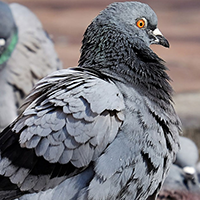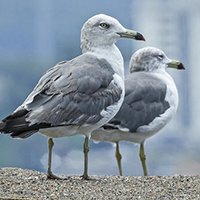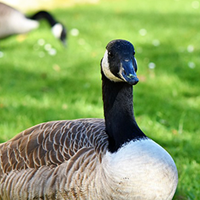Comparing Goose Nest Removal and Chemical Oiling of Goose Eggs
Similarities of Both Systems
- Both methods require a minimum of five visits per month over a two-months project season.
- Both methods require a dog to move the geese off their nests.
- Both, the chemical and removal systems require a thorough follow-up system.
- Both methods require a permit issued by the Canadian Wildlife Service with subsequent stipulations to that permit.
- Both the chemicals and removal systems require staff that is experienced in their respective fields.
The Disadvantages of Chemical Oiling
- The first disadvantage is that the geese stay on the nest for as long as they think they have an active nest. This could mean that they would be on the nest for as much as six weeks at a time.
- This also means that during this time, the geese will be pooping at your site for the entire nesting season.
- During this time they will be protective of their nests and show aggression to all visitors to your site. This means that your visitors (and their equipment) may be attacked, hit, pushed, chased, and you may suffer the lawsuits that could ensue.
- Unfortunately, the geese won't realize that this is not a safe nesting site and will return again, year in and year out. The message to move on and leave the property will not be received.
- Nesting is the crucial time of year where we can assist you to improve your odds, and achieve better results with a minimal budget.
- In the event that the oiling of the eggs is not thorough enough, there is a possibility of partially or deformed chicks. This alone is quite frightening.
- In the past five years that both systems have been tried, the original thought was that the chemical method would be cheaper. As time has proven, and this company can confirm over several tenders of late, that the actual removal of eggs and nest has been less costly and more effective.
- Application Amount
It is known that several applications of the chemical is necessary so that no eggs remain viable. This would take some 20 visits per month over a two months nesting period. Proper and safe storage of the chemical materials is of importance and depending on your setup, may be an issue. - With everyone's eye on Corporate Social Responsibility and a Chemical Free Green Approach to Community Living, we believe that the addition of any chemical to our environment is unwarranted. There is a better and more evironmentally friendly method available, that also happens to provide more value and better results!
We recommend to all our customers that they remove ALL geese eggs and nests from their sites. The active ingredient in the egg oiling process is Oil, which in its basic format is very dangerous to our waters and since geese use ponds and waterways as their refuge, the water may be easily contaminated with the chemical oil.
The Advantages of Oiling
- An advantage of this method is the relative ease of spraying the eggs en masse by a qualified technician of the Pest Control Industry.
The Advantages of Geese Nest Removal
- The geese will not stay on their nests, there won't be any goslings hatching - therefore ,no population increase.
- The geese may return to investigate, and can be chased off again.
- The geese may find a different area to nest and that area will be by lessons learned: Avoid Conflict with Humans.
- You will have the benefit of six weeks of less poop on your property - the unsightly look and smell of it all can be avoided.
- They often leave for the entire season.
- You no longer have aggressive geese on your property = No liability, no injuries, no equipment damage, or conflict with humans. The geese are only there to protect their nests and their eggs, and if the nests are no longer there. there's no reason to stay and no conflict.
- There are no chemical additives, hence no danger of ground or water contamination.
- There's no possibility or of partially or deformed birds.
- Your site will not be regarded as a safe nesting site and will not become a repeat breeding ground. You will save on further costs of removing geese in the future.
Translocation - Second Period of the Year
Translocation is a tried and proven removal method. Once a year geese molt/drop their fathers at which time they are flightless. They gather around ponds for protection from ground animals. During this time the geese are vulnerable to capture and relocation to another more favorable area further down the final migration path. This is usually achieved by capturing them and herding them into livestock trucks or specially designed pickups for transportation and eventual release. The advantage is that they are no longer around to bother you the rest of the season. Several cities have used this method and found it to be extremely successful.
In Conclusion
We highly recommend that you amend your geese control plan to include Nest Removal and Egg Destruction. A special permit will be required from the Canadian Wildlife Service to perform this task and we would be pleased to guide you through the process as we partner in the success of your program.
Related Articles: https://www.hawkeye.ca/blog/geese-nest-removal-in-brampton
















